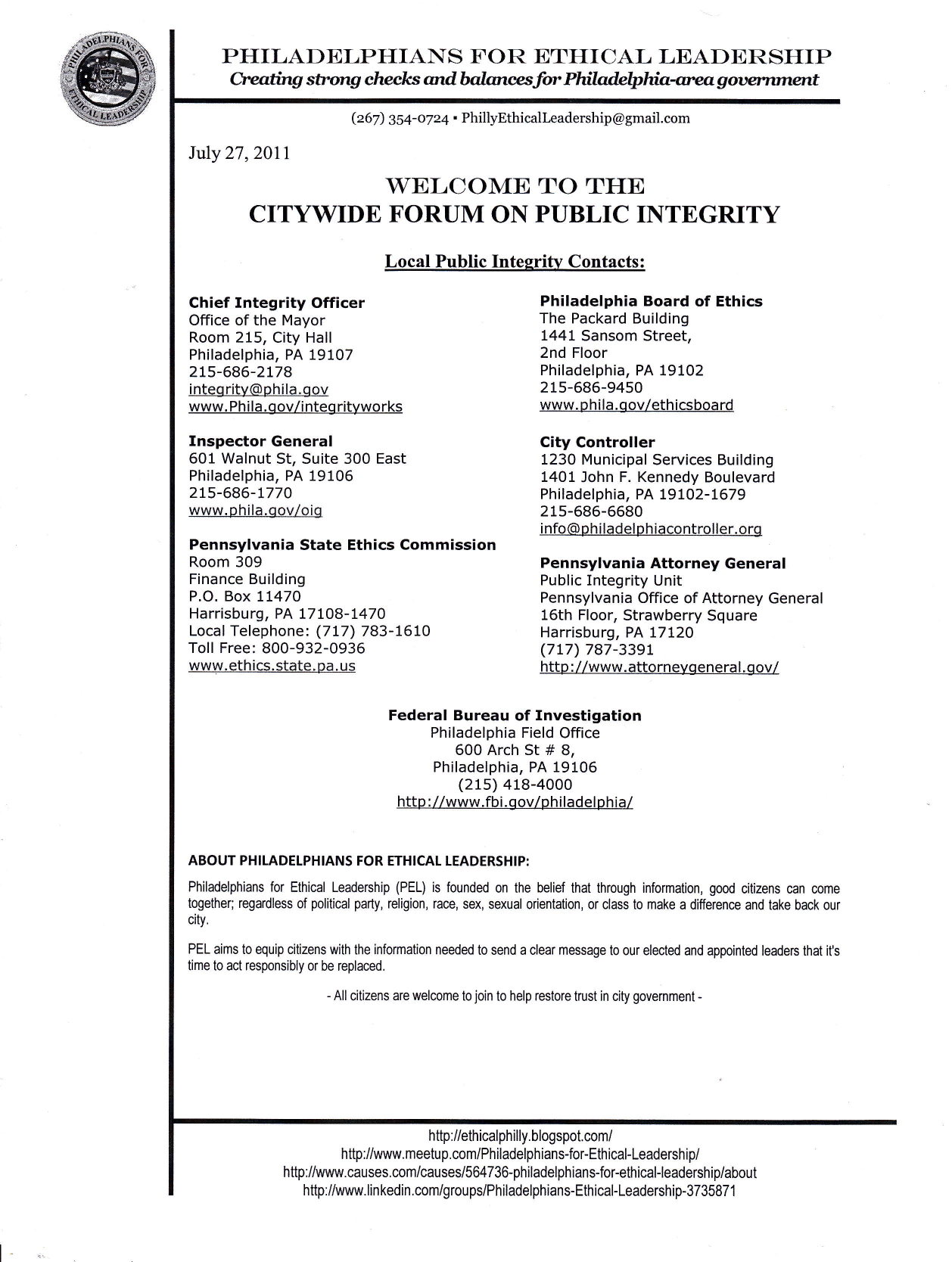
 BY ALEX POTTER Philadelphians for Ethical Leadership, a non-profit group headed by Ben Mannes, a former Washington, D.C. police officer who now lives in Port Richmond, held a meeting last night at the Central Library they called “A Citywide Forum on Public Integrity” hoping “to give citizens a better understanding on what behavior constitutes public corruption, what the contributing factors to public corruption are, who investigate the different types of public integrity issues, and how best to report it.”
BY ALEX POTTER Philadelphians for Ethical Leadership, a non-profit group headed by Ben Mannes, a former Washington, D.C. police officer who now lives in Port Richmond, held a meeting last night at the Central Library they called “A Citywide Forum on Public Integrity” hoping “to give citizens a better understanding on what behavior constitutes public corruption, what the contributing factors to public corruption are, who investigate the different types of public integrity issues, and how best to report it.”
A panel of two men with pedigrees in rooting out corruption at various levels of government was present to discuss ways to report and correct public malaise. Pat Blessington, the Senior Deputy Attorney General of Pennsylvania for fourteen years, was appointed as Chief of Special Investigations by Philadelphia District Attorney Seth Williams in June, and is leading a newly formed Corruption Prosecution Task Force. “It’s the public,” said Blessington after he was introduced by Mannes, “which pushes the prosecution, it’s the public which witnesses the corruption, it’s the public which talks to the newspapers and it’s the public which sits on juries.”
John Roberts is the supervisor of the FBI’s Philadelphia Public Corruption Squad, which works “hand and glove” with the United States Attorney’s office. Roberts’ squad is comprised of members of the Philadelphia Police Department and the new Corruption Prosecution Task Force, which Roberts said, “was specifically set up to address allegations of corruption within the city police department.” He also mentioned that until Commissioner Ramsey came to power, the FBI had no interaction with the Philadelphia PD’s internal affairs department. With the formation of the Task Force, Roberts said the FBI now has the unprecedented screening ability to “hand pick” local cases that require federal investigation.
It was Roberts’ team that planted the bug in Mayor John Street’s office with the aid of the U.S. Attorney’s office in October 2003, which was mysteriously  discovered just days before his re-election. Robert’s ordered the affidavits for the wire-tapping and testified before the grand jury during the trial following the Philadelphia police’s discovery of the listening device. When asked how the bug had been discovered — something that has never been revealed — Roberts demurred, citing “strict secrecy laws” and “regulations are imposed on us” in cases involving wire-tapping. The fact that the race between Street and Sam Katz at the time was so tight and heated added to the necessity of that secrecy. The Street campaign was able to spin the bugging as a case of the Bush Administration using the Justice Department to swing the election for the Republicans, and the discovery of the bug was believed by many to have boosted Street’s chances after he won by a margin that widened significantly despite the controversy.
discovered just days before his re-election. Robert’s ordered the affidavits for the wire-tapping and testified before the grand jury during the trial following the Philadelphia police’s discovery of the listening device. When asked how the bug had been discovered — something that has never been revealed — Roberts demurred, citing “strict secrecy laws” and “regulations are imposed on us” in cases involving wire-tapping. The fact that the race between Street and Sam Katz at the time was so tight and heated added to the necessity of that secrecy. The Street campaign was able to spin the bugging as a case of the Bush Administration using the Justice Department to swing the election for the Republicans, and the discovery of the bug was believed by many to have boosted Street’s chances after he won by a margin that widened significantly despite the controversy.
The resounding theme of the forum was that exposure of corruption at the state and local levels is primarily the responsibility of grassroots movements. Mr. Blessington said that rooting out corruption is easier at the federal level because federal judges are appointed to watch out for just those kinds of cases. In cities, civilian watchdog groups are “invaluable,” he said, because they inform the media, who can then catch the attention of public officials.
Many citizens in attendance expressed frustration at having to endure tax hikes while simultaneously watching government officials, such as former Director of Housing Authority Carl Green, embezzle and waste their tax dollars with impunity. Former assistant district attorney and current candidate for city council Michael Untermeyer passionately expressed outrage about the collective shrug of complacency that has accompanied the scandals surrounding Greene and Superintendent of Schools Arlene Ackerman. Mr. Blessington responded by saying that “a culture of corruption has been fostered” in Philadelphia and reiterated that controversies like the ones Untermeyer is concerned about need time and discretion to be investigated. The common answer Mr. Blessington and Mr. Roberts both provided for similar emotionally-charged questions asked by other attendees was that, unfortunately, “incompetence and ignorance” and wasting money “are not crimes.”
Mr. Mannes ended the forum by saying “wasting government money is an issue. We have enough of it here.” He told the crowd, “It’s on you folks to get out there and start putting your eyes and ears open. A lot of us are angry and tired of people stealing our money in an acceptable format because it hasn’t crossed the criminal line. It’s just ethical at that point.” Mr. Mannes then encouraged the crowd to sign a petition to amend the Home Rule Charter, which would give the Corruption Prosecution Task Force some leeway. For more information, go HERE. Contact information for corruption busters in the 215 after the jump.

